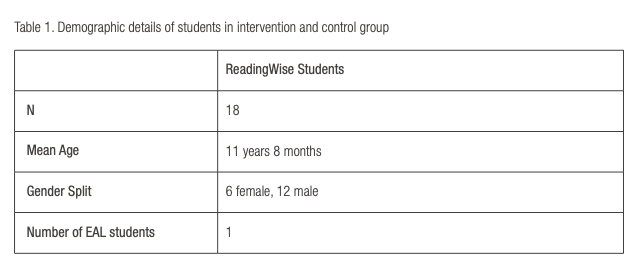
St Ambrose Barlow Roman Catholic High School took part in the Salford ReadingWise pilot. The school selected 18 students with low reading ability to take part in the trial and completed 9 hours of the programme on average. Overall, students gained 11 months in reading age over 12 weeks. In addition to reading gains, teachers reported that students enjoyed using ReadingWise to support their reading.
“The words were challenging and it helped a lot in lessons”
“The best thing was the animations at the end of the questionnaire”
“The pupils seemed to enjoy working on the programme, they were engaged and always keen to move forward.”
Overall, teachers and students responded positively to the ReadingWise programme and St Ambrose Barlow High School are continuing with the intervention to support pupils in their school. This pilot has also provided us with important feedback to help us to continue to develop our programme.
ReadingWise Secondary School Pilot Objectives
ReadingWise English is a literacy solution for the 20% who struggle to read. Research shows that by using a range of techniques, the ReadingWise programme and modules can significantly improve the reading age of students who struggle to read in primary and secondary school.
Using ReadingWise English as a learning tool helps everyone from below-average readers to those with special educational needs to increase their reading ability.
St Ambrose Barlow is a secondary school with just over 900 pupils. 23% of pupils are entitled to free school meals (compared to 28% national average). In 2014 74% of pupils attained five GCSEs grade A* to C including English and Mathematics. The objective of this pilot was to examine the effectiveness of the ReadingWise English programme with pupils at St Ambrose Barlow High School.
We aimed to answer three main questions:
1. Does ReadingWise English significantly boost students’ reading age in comparison to controls?
2. To what extent are learners engaged when interacting with the intervention?3. How straightforward is the implementation of ReadingWise in the schools involved?
Methodology Recruitment and Procedure
Gatekeepers of St Ambrose Barlow High School were provided with an initial introduction to ReadingWise to discuss the logistics of the pilot and what the expectations would be concerning running the programme and reporting on progress in their school.
Teacher Training
Teachers and teaching assistants received a 90-minute initial training session to ensure they felt confident supervising the ReadingWise sessions with groups of up to 10 students. The training focused on the background of ReadingWise, the optimum environment in which to run the programme, and a thorough introduction to the activities within the programme.
The training session aimed to ensure that supervisors could target support effectively without undermining the independent learning benefits of the programme, as each student has control over their learning environment. The session also provided teachers and teaching assistants access to the programme from a learner’s perspective.
Pre-Intervention Assessments
Students were assessed for reading age one week prior to the intervention using the Salford Reading Test. The results of these school-based tests determined the personalised lesson plan allocated to the students.
ReadingWise English Programme
Daily sessions of ReadingWise have been shown to produce the best learning outcomes. The students selected for the intervention took 20-25 minute ReadingWise sessions daily before registration in the morning. On average students used the programme for 9 hours over a 10-week period. The school agreed on a fixed time to reassess students rather than an ‘end of lesson plan.’
Post-Intervention Assessments and Questionnaires
The school redid benchmarking after the final ReadingWise session and administered student and teacher questionnaires that examined students’ engagement with the programme and details on the implementation of the programme in their school.
Participants in the Secondary School Literacy Intervention Trial
St Ambrose Barlow High School selected 18 low-performing students from Year 7 to take part in the ReadingWise pilot. Please see Table 1 for student demographic details.

Results of using ReadingWise as a secondary school literacy intervention
Impact: Reading Age Improvements
All students were assessed for reading age pre and post-intervention using the Salford Reading Test. The group’s mean reading age pre-intervention was 108 months (range 84-151 months).
This increased significantly after students received the intervention (a total of 9 hours on average), resulting in a mean reading age of 119 months (range 85- 151 months). Overall students that completed the ReadingWise programme gained an average of 11 months improvement in reading age over 12 weeks.
Table 2 displays students' pre and post-intervention scores.

Ease of Implementation of ReadingWise
Our second aim was to examine students’ level of enjoyment and engagement when interacting with the ReadingWise programme and how helpful they found the programme for their learning. To examine this question, we asked a series of questions (read by the teacher) that offered three possible answers:
Question 1: Was it easy to find you activities and games on ReadingWise? Answer options: easy, okay or difficult.
Question 2: Did you enjoy using ReadingWise? Answer options: quite a lot, a little bit, not at lot.
Question 3: Do you think your reading has improved since using ReadingWise? Answer options: quite a lot, a little bit, not at lot.
Question 4: How focussed were you when using ReadingWise? Answer options: quite a lot, a little bit, not at lot.
Question 5: Have the ReadingWise sessions helped you in your normal lessons? Answer options: quite a lot, a little bit, not at lot.
Question 6: Do you think other children should use ReadingWise? Answer options: yes/no.
Question 7: Would you like to continue using ReadingWise? Answer options: yes/no.
All 18 pupils completed the student questionnaire post-intervention. All pupils reported that they found the programme ‘easy’ or ‘okay’ to use. 12 students thought their reading had improved ‘quite a lot’ or a little bit’ and 15 students reported that ReadingWise has helped them during their regular lessons. 13 pupils reported that they enjoyed the programme and 5 pupils did not enjoy the programme. 12 out of 18 pupils would like to continue using ReadingWise to support their learning.
The supervisor reported that pupils enjoyed meeting in the mornings to attend the ReadingWise sessions and were always keen to move forward on the programme.
Another supervisor reported that most in his group were engaged with the programme and enjoyed the different elements. In particular, they enjoyed the word-to-sound matching quiz and the drag-and-drop quiz. Students also enjoyed collecting coins after completion of these tasks. Both supervisors noticed improvements in students’ reading accuracy.
We asked students what they liked best about the programme and they gave the following positive responses:
- “All of it because I got to learn new words”
- “That it helped you with spelling”
- “Helped me with my writing/spelling
- “The games”
- “The token system”
- “The one where you say a word and draw it in the air”
- “The words were challenging and it helped a little bit in lessons”
- “That there was lots of questions”
- “Because it helped me a big way”
- “The fact that you were supposed to collect tokens”
- “I like the way that the tokens and competing against people”
- “The best thing was the animations at the end of the questionnaire”
- “I liked that you can learn your spelling, punctuation at the same time”
Ease of Implementation of ReadingWise
Both supervisors were satisfied with the training provided by ReadingWise. However, both supervisors reported that they often experienced technical difficulties for example students struggled to log on to the system occasionally however this was resolved by re-setting the programme.
Both supervisors rated ReadingWise as ‘excellent’ and supported the continuation of ReadingWise in their school.
Key Takeaways from Trial Period
The majority of students involved in the trial at St Ambrose Barlow High School showed improvements in reading after using the ReadingWise programme. Students gained 11 months on average, over 12 weeks.
However, the school did not have a control group and thus findings should be interpreted with caution. Teachers reported that students enjoyed attending the ReadingWise sessions in the morning and noticed improvements in students’ reading accuracy. As such, St Ambrose Barlow High School continued to work with ReadingWise to support pupils in their school.

Work with ReadingWise to improve literacy results in your school
Take a look at our other case studies and testimonials from teachers, TAs, headteachers, and literacy leads at primary and secondary schools and multi-academy trusts (MATs).
ReadingWise offers four core modules, plus a comprehensive Learners Library, Teacher Training, and a Dashboard that you can integrate with other school software, and use to demonstrate attainment against the Pupil Premium Budget. Here is our pricing for more information.
Zip : Phonics for primary schools, reception, and Y1.
Vocab : A special vocabulary programme for learners aged 6 - 16, for primaries and secondaries.
Decoding : A comprehensive module for learners with a reading age below their chronological age irrespective of key stage.
Comprehension : A powerful, engaging, and fun literacy intervention module to develop the quest for meaning behind a narrative. Its content, structure, and design deliver age-appropriate sessions for Primary and Secondary schools Years 5-9.
Over 100,000 pupils in UK schools have completed a ReadingWise programme! We hope to help you and your children, too.
“ReadingWise is really good value for money. We have seen it as being a highly effective intervention that offers personalised learning to large numbers of children and has a measurable impact in a short amount of time.” Jenny Taylor, Headteacher, Horfield Primary School, Bristol - 85% pass in 2016 reading SATs
Boost your school's literacy results and arrange your 20-minute demo at a time to suit you.








